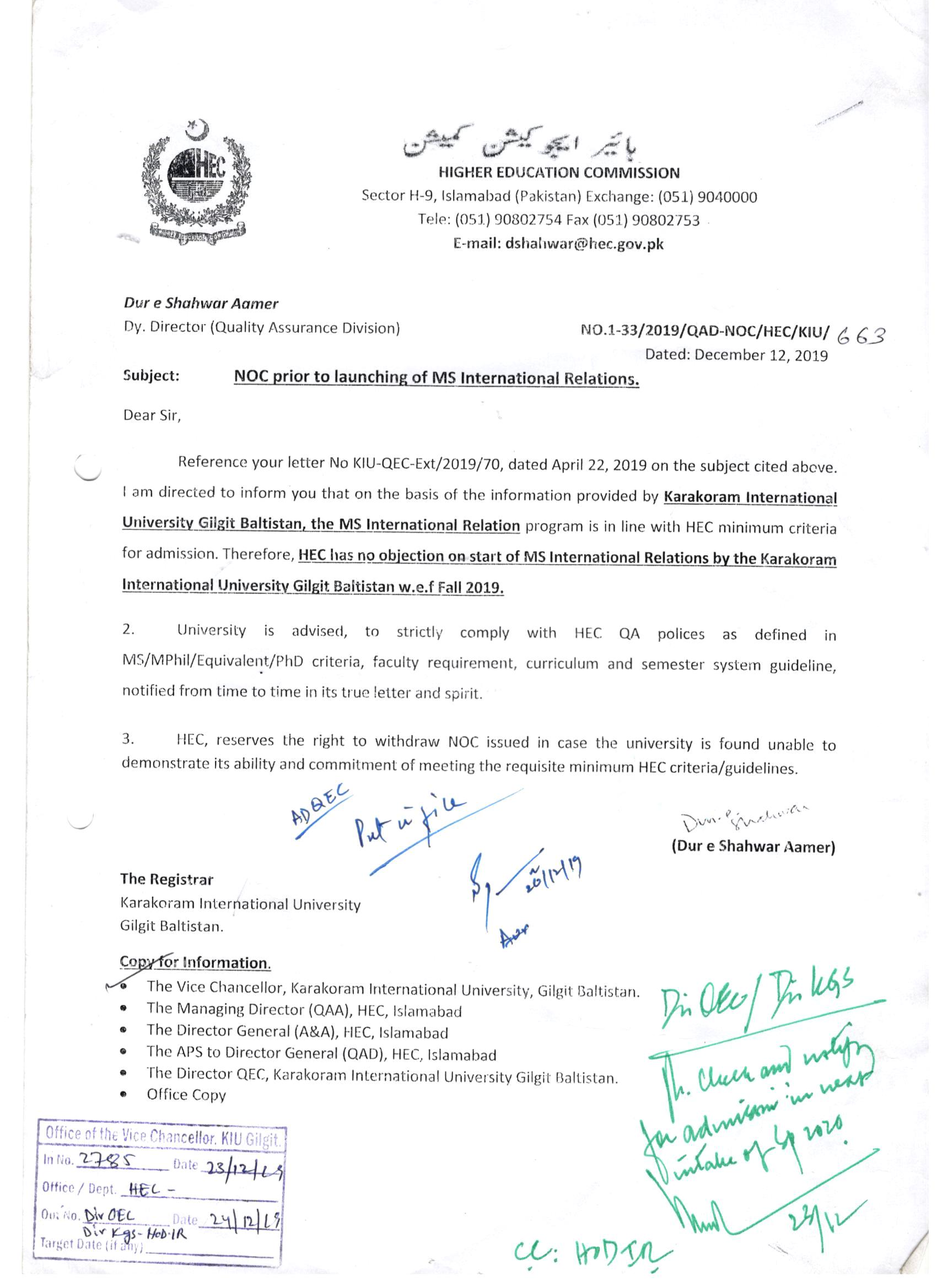MS International Relations
-
Admission Requirement
-
Scheme of Study
-
Program NOC
-
Gallery
Eligibility Criteria (M.Phil. Program)
- Sixteen years of schooling or 4-years education (124-130 credit Hours) after HSSC/F.Sc/ Grade 12 equivalents in the relevant subject with at least 2.50 CGPA from a recognized University as per HEC rules.
- Mandatory to pass NTS Type test to be conducted by KIU itself.
SCHEME OF STUDIES
| MS IR Semester I: | |||
| Codes | Course Titles | Credits | |
| 1 | IR 701 | International Relations: Advanced Theory and Practice | 3 |
| 2 | IR 704 | Power, Interdependence and Transnationalism | 3 |
| 3 | IR 708 | Advanced Foreign Policy Analysis | 3 |
| 4 | IR 703 | Advanced Research Methodology- Qualitative Analysis | 3 |
| Total: | 12 | ||
| MS IR Semester II: | |||
| Codes | Course Titles | Credits | |
| 1 | IR 706 | Politics of Middle East | 3 |
| 2 | IR 707 | Advanced Research Methodology – Quantitative Analysis | 3 |
| 3 | IR 702 | Global Political Economy | 3 |
| 4 | IR 709 | Traditional and Non-traditional Security Paradigms | 3 |
| Total: | 12 | ||
| MS IR Semester III & IV: | |||
| Codes | Course Titles | Credits | |
| 1 | IR 710 | Thesis | 6 |
| Grand Total: | 30 | ||
Following is the scheme of studies for 2 – Years MS/MPhil in International Relations of 30 credit hours including 6 credit hours of thesis, which is compulsory.
List of Core Courses:
It is suggested that the core courses should be of 3 credit hours and also all the optional courses of 3 credit hours. However, the academic bodies of the universities are autonomous to determine the weightage of each course.
- IR 701: International Relations: Advanced Theory and Practice (3 Credit Hours)
- IR 703: Advanced Research Methodology- Qualitative Analysis (3 Credit Hours)
- IR 709: Traditional and Non-traditional Security Paradigms (3 Credit Hours)
List of Optional Courses:
Following is an optional list of courses to be offered by the universities concerned. The course teacher(s) would provide the course contents and the core/recommended books at the time of the offering of a course. The academic bodies of the respective universities are free to add other titles as well in the given list of optional courses.
- IR 702: Global Political Economy
- Politics of South Asia
- Ethnic Conflict in Global Perspective
- IR 706: Politics of Middle East
- International Law and Use of Force
- Contemporary Trends in International Law
- Comparative Analyses of Foreign Policy of Major Powers (any two)
- IR 708: Foreign Policy Analysis
- Role of International Financial Institutions in International Relations
- An Analysis of Pakistan’s Foreign Policy
- Politics and Security of Asia-Pacific Region
- National Security Issues in Contemporary Pakistan
- Contemporary Environmental Issues
- Major Issues of Muslim World
- Conflict and Cooperation in South Asia
- Peace Building in Post-Conflict Societies
- International Organizations
- Power Sharing in Multiethnic States
- International Security, Arms Control, and Nuclear Non-Proliferation
- Chemical, Biological, Nuclear, and Radiological Terrorism
- Maritime Security in the Indian Ocean
- Kinetic and Non-Kinetic Warfare
- Central Asian and Caucasus Regions
- Politics of Human Rights
- Contemporary Political Theories
- IR 711: Regional Economic Integration
- IR 707: Advanced Research Methodology – Quantitative Analysis
- IR 704: Power, Interdependence and Transnationalism
- Contemporary Issues in International Relation

